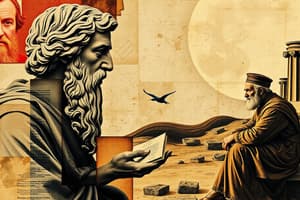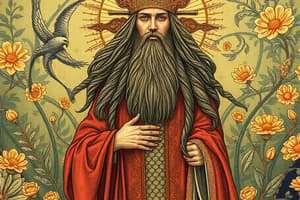Podcast
Questions and Answers
Who is known for the concept of 'cogito ergo sum' which means 'I think, therefore, I am'?
Who is known for the concept of 'cogito ergo sum' which means 'I think, therefore, I am'?
- Rene Descartes (correct)
- David Hume
- John Locke
- Socrates
Who proposed the idea that the self is composed of three parts: the rational self, spirited self, and appetitive self?
Who proposed the idea that the self is composed of three parts: the rational self, spirited self, and appetitive self?
- Rene Descartes
- Socrates
- John Locke
- Plato (correct)
Who is associated with the concept of the self as a 'unifying subject, an organizing consciousness that makes intelligible experience possible'?
Who is associated with the concept of the self as a 'unifying subject, an organizing consciousness that makes intelligible experience possible'?
- John Locke
- Immanuel Kant (correct)
- Rene Descartes
- David Hume
Who is known for the idea that the self is divided into the conscious, preconscious, and subconscious?
Who is known for the idea that the self is divided into the conscious, preconscious, and subconscious?
Who proposed the concept of the self as the brain?
Who proposed the concept of the self as the brain?
Who is associated with the concept of the 'social self'?
Who is associated with the concept of the 'social self'?
Who is known for the idea that 'there is no self'?
Who is known for the idea that 'there is no self'?
Who focused on the role of behavior in shaping our sense of self?
Who focused on the role of behavior in shaping our sense of self?
In Buddhism, what is the concept of Anatta?
In Buddhism, what is the concept of Anatta?
Who is credited with the concept of self-efficacy in the context of social learning?
Who is credited with the concept of self-efficacy in the context of social learning?
What is the term for mental culture in Buddhism?
What is the term for mental culture in Buddhism?
What is the main focus of the 8 Noble Eightfold Path in Buddhism?
What is the main focus of the 8 Noble Eightfold Path in Buddhism?
What is the term used in Hinduism to refer to the metaphysical self?
What is the term used in Hinduism to refer to the metaphysical self?
Who focused on the duality of the self, including the self-concept and self-awareness?
Who focused on the duality of the self, including the self-concept and self-awareness?
What is the term used in Buddhism to refer to the conscious mind?
What is the term used in Buddhism to refer to the conscious mind?
Which of the following is NOT one of the 8 Noble Eightfold Paths in Buddhism?
Which of the following is NOT one of the 8 Noble Eightfold Paths in Buddhism?
Flashcards are hidden until you start studying
Study Notes
Philosophers' Views on the Self
- Socrates believed that the soul is immortal and plays a crucial role in shaping human identity.
- Plato, a student of Socrates, proposed that humans have a dualistic nature, comprising three components of the soul: rational, spirited, and appetitive.
- Saint Augustine believed that the soul is eternal and communed with God, while the body is mortal and subject to decay.
Modern Philosophers' Views on the Self
- Rene Descartes introduced the concept of self-consciousness, famously stating "I think, therefore, I am."
- John Locke argued that human knowledge is rooted in sense experience and shapes our values and ideas.
- David Hume proposed that there is no self, only impressions and ideas.
- Immanuel Kant believed that the self is a unifying subject that organizes consciousness and makes experience possible.
Psychological and Sociological Perspectives on the Self
- Sigmund Freud proposed that the self is multi-layered, consisting of conscious, preconscious, and subconscious components, with the Id, Ego, and Superego.
- Gilbert Ryle focused on behavior and rejected the idea that humans are "ghosts in a machine."
- Paul Churchland argued that the self is equivalent to the brain.
- Merleau-Ponty believed that the unified experience of the self is the paradigm for understanding human nature.
- George Herbert Mead developed the concept of the social self, which is shaped by language, play, and games.
- Lev Vygotsky studied the self through a sociocultural lens, highlighting the "leading factor in development."
Other Perspectives on the Self
- Ruth Benedict was a renowned cultural anthropologist who studied the relationship between culture and personality.
- Murray Bowen developed the 8 interlocking concepts in family research.
- William James explored the basic duality of the self, comprising the self-concept (knowledge of who we are) and self-awareness (the act of thinking about ourselves).
- Albert Bandura introduced the concept of self-efficacy within the context of social learning.
Buddhist Perspectives on the Self
- The Buddhist concept of Anatta proposes that the self is an illusion, and there is no permanent concept of the self.
- The 5 aspects of the self in Buddhism are: physical manifestation, sensation, conceptualization, dispositions to act, and consciousness.
- The Buddhist teachings of Siddhartha Gautama (Buddha) reject the concept of a permanent, self-existent soul (atman).
- The 8 Noble Eightfold Paths to Nirvana (freedom from attachments) are: Right View, Right Intention, Right Speech, Right Action, Right Livelihood, Right Effort, Right Mindfulness, and Right Concentration.
Hinduism
- Hinduism is a spiritual belief and religious tradition that originated in India.
- In Hinduism, religion is a matter of practice rather than belief, emphasizing the importance of living a virtuous life.
Studying That Suits You
Use AI to generate personalized quizzes and flashcards to suit your learning preferences.




